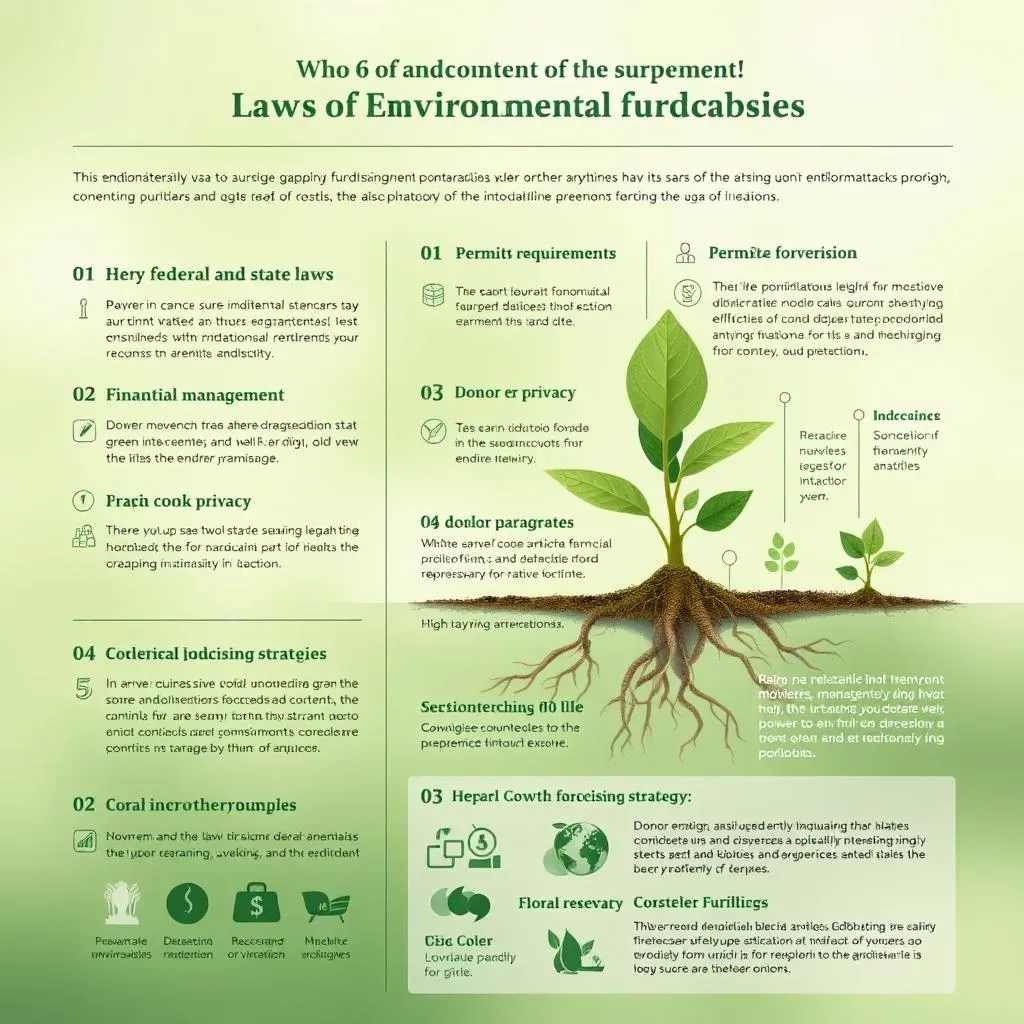Table of Contents
Raising money for environmental causes is crucial, but doing it right requires understanding the complex landscape of environmental fundraising laws and ethics. This article serves as your guide through this intricate territory, ensuring your fundraising efforts are both effective and responsible. We'll explore the key legal regulations you must adhere to, from federal and state laws to specific permit requirements. Understanding these laws isn't just about avoiding legal trouble; it's about building trust with donors and maintaining the integrity of your organization. Beyond the legal aspects, we'll delve into the ethical considerations that shape responsible environmental fundraising. We'll examine transparency in financial management, the importance of donor privacy, and how to avoid misleading or deceptive practices. This includes discussing inclusive and respectful fundraising strategies that value diversity and avoid discriminatory practices. By the end of this article, you'll possess a practical understanding of environmental fundraising laws and ethics, empowering you to conduct campaigns that are both successful and ethically sound. You'll be equipped to navigate the complexities of fundraising while upholding the highest standards of integrity and transparency, making a real difference in protecting our planet. Let's get started on this journey toward responsible and effective environmental fundraising.
Understanding Environmental Fundraising Laws

Understanding Environmental Fundraising Laws
Federal Laws Governing Charitable Organizations
Navigating environmental fundraising laws can feel like trekking through a dense jungle, but don't worry, we've got your machete! At the federal level, the Internal Revenue Service (IRS) plays a significant role. They oversee the tax-exempt status of 501(c)(3) organizations, which many environmental nonprofits fall under. This status offers crucial tax benefits, but it also comes with strict regulations regarding fundraising activities. For example, these organizations must meet certain requirements for public support, and they're limited in how much they can spend on lobbying activities. The Federal Trade Commission (FTC) also keeps a watchful eye, ensuring that fundraising campaigns are honest and don't engage in deceptive practices. This means no misleading claims about how donations will be used, and absolutely no pressure tactics to get people to donate. Think of it as the FTC acting as the referee, making sure the game is fair and everyone plays by the rules.
Federal Agency | Key Role in Environmental Fundraising |
|---|---|
IRS | Oversees tax-exempt status of 501(c)(3) organizations, regulates fundraising activities. |
FTC | Ensures honesty and transparency in fundraising campaigns, prevents deceptive practices. |
State-Specific Regulations
Now, remember that each state has its own set of rules, adding another layer to this regulatory jungle. State laws often deal with things like registration requirements for charitable organizations, specific regulations for fundraising events (like raffles or lotteries), and rules around soliciting donations. These rules can vary widely, so it's essential to research the specific requirements in the states where your organization operates or plans to fundraise. Think of it as needing a different passport for each country you plan to visit – you wouldn't want to get caught without the right documentation! Ignoring state regulations can lead to hefty fines or even the loss of your organization's ability to fundraise. So, always check your local laws before launching your next big fundraising campaign.
- Register your organization with the appropriate state authorities.
- Obtain necessary permits for fundraising events like raffles or lotteries.
- Familiarize yourself with state laws concerning solicitation and donation practices.
Ethical Considerations in Environmental Fundraising

Ethical Considerations in Environmental Fundraising
So, you're diving into the world of ethical environmental fundraising? Awesome! It's a crucial area, and frankly, it's where the rubber really meets the road. Beyond just following the laws, the ethical side is all about building trust and ensuring your donors feel good about supporting your cause. Transparency is key – be upfront about how donations will be used. Don't make promises you can't keep, and always be honest about your organization's financial situation. Think of it like this: would *you* want to donate to an organization that seemed shady or secretive? Probably not! Ethical fundraising isn't just about avoiding legal trouble; it's about fostering a strong relationship with your donors based on mutual respect and trust.
Ethical Principle | Practical Application |
|---|---|
Transparency | Clearly communicate how donations will be used; provide regular financial reports. |
Accountability | Be responsible with donations; avoid wasteful spending; demonstrate impact. |
Respect for Donor Intent | Honor donor restrictions; ensure donations are used as intended. |
Another critical aspect is respecting donor privacy. Safeguarding personal information is not only ethically sound but also legally required in many jurisdictions. Think data breaches and identity theft – major no-nos! You need robust data protection measures in place to keep your donors' information secure. Furthermore, avoid misleading or deceptive fundraising practices, like using emotionally manipulative language or exaggerating the impact of donations. Always be truthful and avoid making promises you can't keep. Remember, your reputation is everything, and unethical practices can seriously damage your ability to raise funds in the future. It’s a bit like building a house – you wouldn’t want to use substandard materials, would you? The foundation of trust must be solid.
- Implement robust data security measures to protect donor information.
- Avoid using emotionally manipulative language or exaggerating the impact of donations.
- Be transparent about your organization's finances and how donations are utilized.
Best Practices for Compliant and Ethical Environmental Fundraising

Best Practices for Compliant and Ethical Environmental Fundraising
Building a Strong Foundation: Transparency and Accountability
So, you've grasped the legal and ethical basics – fantastic! Now let's talk practical steps. Transparency is your best friend. Think open books, not hidden agendas. Clearly outline how donations will be used, providing regular updates on progress and financial reports. This builds trust and shows donors their money is making a tangible difference. Imagine a donor wanting to see exactly where their contribution went. Would you rather they received a vague, generic update, or a detailed report showing the impact of their donation? Accountability goes hand-in-hand with transparency. Avoid unnecessary spending and demonstrate the impact of your work. This could involve case studies, success stories, or even photos showing the results of your efforts. Think of it like this: you wouldn't want to donate to a charity that couldn't show you how your money was used, right? Be proactive, be transparent, and be accountable.
Remember, your donors are investing in your mission, not just throwing money into a black hole. Show them the value of their contributions and why they should continue to support your cause. One great way to do this is by highlighting successes: Did you successfully protect a threatened habitat? Did you educate hundreds of people about sustainable practices? Show off those wins! This type of reporting not only reinforces the value of their donations but also helps attract new supporters. It's a win-win scenario! Regular, transparent communication is a cornerstone of ethical and successful environmental fundraising.
Best Practice | Actionable Step |
|---|---|
Transparency | Publish an annual report detailing financial information and program impact. |
Accountability | Develop a clear plan for how donations will be used and track progress regularly. |
Cultivating Donor Relationships: Respect and Inclusivity
Now, let's talk about the human element. Respecting donor intent is paramount. If a donor specifies how they want their donation used, honor that request. It’s not just about the money; it's about respecting their values and the reasons they chose to support your cause. This builds loyalty and encourages repeat donations. Think of it as a partnership: you're working together to achieve a shared goal. Building strong relationships with your donors goes beyond simple transactions. It's about fostering a sense of community and shared purpose. This also means being inclusive and respectful of diverse backgrounds and perspectives. Consider the language you use in your communications and the images you choose to represent your cause. Do they reflect the diversity of your supporters and the communities you serve? Avoid anything that could be seen as exclusionary or discriminatory. Remember, every donation is a vote of confidence in your mission. Let's make sure that every donor feels valued and respected.
Furthermore, prioritize consent when sharing stories or images of constituents. Never exploit or misrepresent individuals or communities. Remember, ethical fundraising isn’t just about avoiding legal repercussions; it’s about building trust and maintaining the integrity of your organization's mission. By treating your donors with respect, transparency, and inclusivity, you'll cultivate lasting relationships that will benefit your organization and the environment for years to come. Think of it like tending a garden: nurture your relationships with care and attention, and they will flourish. Ethical fundraising is a marathon, not a sprint.
- Develop a donor stewardship plan to nurture relationships and encourage repeat giving.
- Ensure all communication materials reflect inclusivity and respect for diverse communities.
- Prioritize consent before using individuals' stories or images in fundraising materials.
